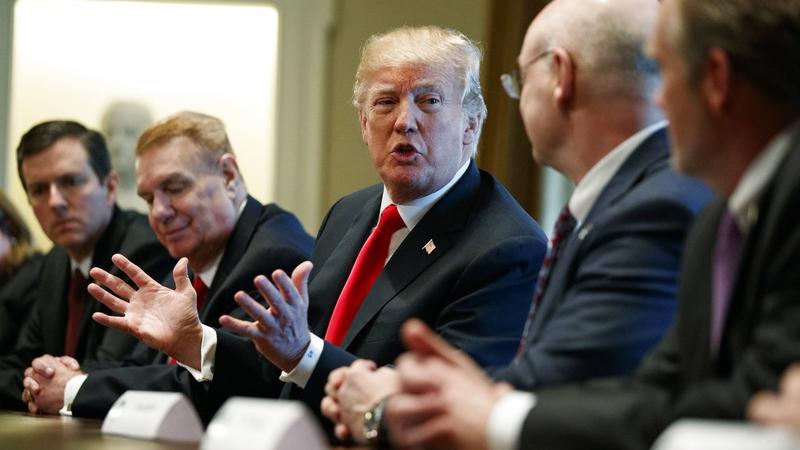Media Report

- Reuters President Donald Trump announced on Thursday he would impose hefty tariffs on imported steel and aluminum to protect U.S. producers, risking retaliation from major trade partners like China, Europe and neighboring Canada.Trump said the duties, 25 percent on steel imports and 10 percent on aluminum, would be formally announced next week, although White House officials later said some details still needed to be ironed out. The announcement came after what one person with direct knowledge of the discussions described as a night of "chaos" in the White House due to frequent switching of positions in the administration.The tariffs were sharply criticized by some senior Republican lawmakers as well as industries ranging from autos to oil to construction equipment. A major concern is that U.S. farm exports could be hit hard in retaliation by steel-exporting countries.China has already threatened to curb imports of U.S. soybeans, and the European Union has said it will consider action as well. President Xi Jinping's top economic adviser, Liu He, held talks with the Trump administration in Washington on Thursday.The discussion was described as "frank and constructive", by a White House official, and focused on "ways to ensure fair and reciprocal trade."
- Los Angeles Times reports: "Some Taiwanese have long feared that China would try to take back the island by force. This week China tried a far gentler approach: measures to make it easier for Taiwanese to invest, work and study on the mainland. Still, the 31 measures unnerved the government in Taipei, which accused China of trying to lure away talent while undermining Taiwanese political identity. Those reactions from Taipei come less than a week before China's legislature begins annual meetings that normally include a sweeping, high-level statement on the future of Beijing's ever thorny relations with Taiwan. They also follow nearly two years of diplomatic and economic pressure from Beijing against Taiwanese President Tsai Ing-wen. China claims sovereignty over democratic and self-ruled Taiwan, viewing it as a rogue province."
- Brookings comments: "To Xi or not to Xi? That is the existential question that will be posed to China's National People's Congress in the coming days, as it considers indefinitely handing over the country's political reins to President Xi Jinping. The Central Committee of the Chinese Communist Party has proposed removing a clause from the country's constitution... which limits both the presidency and vice presidency to two five-year terms. Undoing this restriction essentially lines Xi up to be "President for Life." Another proposed change would enshrine "Xi Jinping Thought on Socialism with Chinese Characteristics for a New Era" in the constitution's preamble, following Marxism-Leninism, Mao Zedong Thought, and Deng Xiaoping Theory. While ideas promoted by Xi's two immediate predecessors, Jiang Zemin and Hu Jintao, would also be incorporated, their names would not, thus venerating a trifecta of Chinese leaders—Mao, Deng, and Xi—only to reinforce Xi's egoism."
Calendar
- 2018-02-28 China expresses 'strong dissatisfaction' with US duties on Chinese aluminum foil
- 2018-02-27 China's new economic guru is trying to stop a trade war
- 2018-02-26 The 'Quad' Is Not A Rival To China's Belt And Road Initiative -- It's A Precursor
- 2018-02-25 The US risks making a strategic blunder over China
- 2018-02-23 China's big conglomerates are no longer buying up the world
- 2018-02-22 Top US Treasury official slams China's 'non-market behavior'
- 2018-02-21 A massive US farming industry fears China trade trouble
- 2018-02-20 China would not be the only country hurt by US steel tariffs
- 2018-02-14 The director of the FBI says the whole of Chinese society is a threat to the US
- 2018-02-13 As China Marches Forward on A.I., the White House Is Silent
News
- CNN Why Chinese state media love Elon Musk's latest tweets
- Fortune Why China Is Censoring Winnie the Pooh—And the Letter 'N'
- Los Angeles Times Beijing makes it easier for Taiwanese to work and study in China, and Taipei is freaking out over it
- CNBC Indian military scrambles to keep up after China moves to put forces in Africa
- TIME China Has Detained the Relatives of Four U.S. Journalists, Report Says
- Forbes Why Geely May Be Tesla's Main China Challenger In The Near Future
- Fortune Why China Is Censoring Winnie the Pooh—And the Letter 'N'
- Foreign Policy A Summer Vacation in China's Muslim Gulag
- CNN A social media tycoon is now China's richest man
- CNBC Chinese energy giant CEFC China Energy's chairman has been probed for suspected economic crimes
- The Wall Street Journal An Anbang-Linked Revolutionary Heir Dies in China. Speculation Begins.
- CoinDesk China's Police Expand Crypto Monitoring Overseas
- Financial Times Rust-belt decline poses threat to Chinese growth
Commentary
- Fortune Why China Is Censoring Winnie the Pooh—And the Letter 'N'
- Brookings China's constitutional conundrum
- Forbes China Is Reevaluating Economic Ties In 65 Foreign Countries
- Economist Are China's state giants reformable?
- The Washington Post We got China wrong. Now what?
- Politico No winners in Europe's war against Chinese steel
- Forbes New Finance Chief Shows How China's Politics Have Evolved Under Xi Jinping
- The Harvard Crimson China as Phantom
- The Hill Depending on China and Russia for key minerals could lead to a national security crisis
